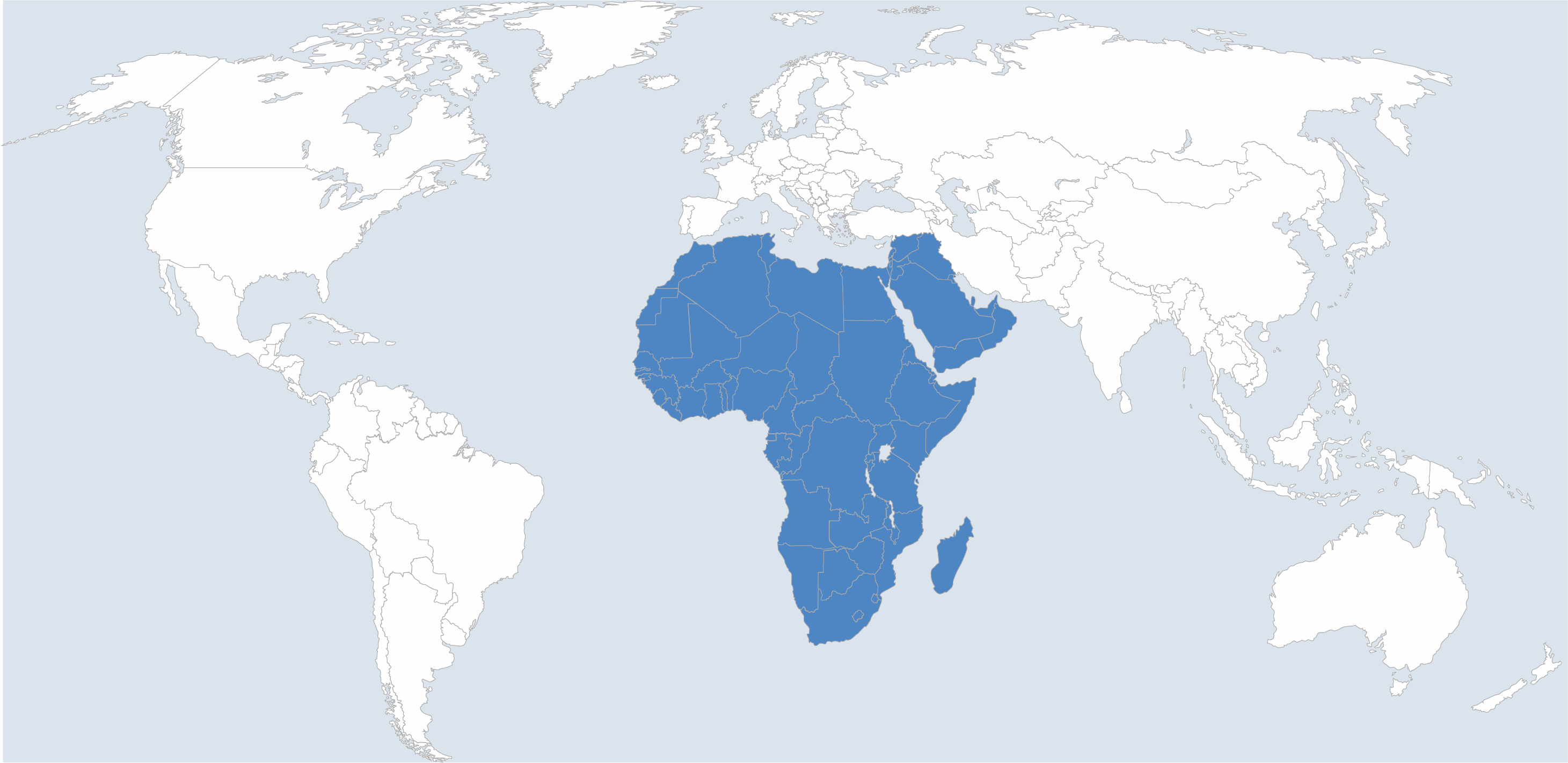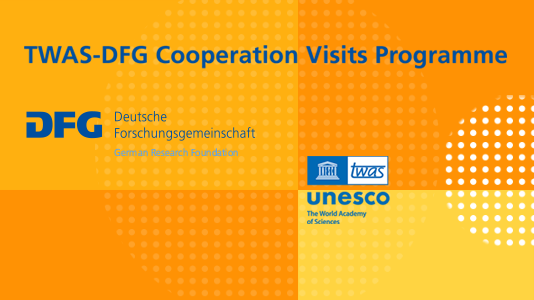Collaborating with Africa and the Middle East
The Africa/Middle East regional area includes all African countries, the Arabian Peninsula, Israel and its neighbouring countries. The regional department represents the interests of the DFG vis-à-vis regional partner organisations and supports scientific cooperation between researchers from Germany and the region.
In addition to establishing and maintaining bilateral relations with strategic partners, the regional department is particularly involved in African science networks.
News
The regional area at a glance
The Africa/Middle East regional department is concerned with creating and cultivating optimum framework conditions for cooperation between researchers from Germany and the Africa/Middle East region. Particular attention is paid to capacity building of science systems in the region. In this way, the DFG also supports early career researchers as an outstanding resource for Africa. In connection with Germany-related research biographies, fruitful relationships can be established in this way between the scientific communities in Africa and Germany.
In addition to providing information for researchers from Germany who are interested in cooperating with partners in the region, the regional department also provides advice in the event of the relevant enquiries from abroad.
Scientific cooperation opportunities in this heterogeneous and rapidly developing region are identified as early as possible and are initiated and supported together with partner organisations in the region.
TWAS-DFG Cooperation Visits Programme
Since 2010, the DFG, together with TWAS (The World Academy of Sciences for the Advancement of Science in Developing Countries), has funded up to 50 young researchers from Sub-Saharan Africa (SSA) each year with a three-month stay at a research institution in Germany. Researchers from all disciplines can apply for up to five years after gaining their doctorate, provided they are pursuing research at an African institution.
Contact: Michaela Krista(externer Link)
Further information:
- Information sheet for the host institution in German(Download)
- Homepage TWAS-DFG Cooperation Visits Programm(externer Link)
- Current Call (SSA(interner Link)
Starting 2024, funding for the northern countries in Africa (Algeria, Egypt, Libya, Morocco and Tunisia) is also available: Current Call (MENA(interner Link).
German-African Cooperation Projects in Infectiology
Since 2008, the DFG has put out an annual call for proposals for “German-African Cooperation Projects in Infectiology”. The aim of funding here is to promote partnership-based research into neglected infectious diseases, including their social and societal effects. In addition to the intellectual balance of the projects, funding prerequisites also include sound concepts for the training of young researchers and the establishment of sustainable research opportunities in Africa. Project proposals are initially submitted as outlines; if an idea is promising, an invitation goes out for the submission of a full proposal. For funded projects, regular colloquia are held alternately in an African country and in Germany.
Contact: Dr. Andreas Strecke(externer Link)
Further information: DFG flye(Download)
Point Sud
The strategic funding programme “Programme Point Sud” was initiated in 2009 as a pilot project to promote humanities and social science research on Africa in Germany. The starting point for the activities is the research institution “Point Sud – Centre de recherche sur le savoir local” in Bamako, Mali, as well as the Point Sud network it has established, to which various other partner research institutions in African countries also belong. “Programme Point Sud” provides the framework for networking activities in the field of German Africa research between various partners in Africa, with a call for proposals being issued on an annual basis.
Contact: Dr. Corinne Flack(externer Link)
Further information:
Initiative for a 2-stage Initiation of International Collaboration (I2I)
I2I is a DFG funding instrument that aims to initiate international scientific collaborations between researchers from African countries and Germany within specific research areas. It provides opportunities to transform promising ideas into competitive collaborative research proposals. I2I comprises a 2-stage process with an inclusive and largely self-organised matchmaking element.
| 1. Stage: Matchmaking | 2. Stage: Pre-project Proposals |
|---|---|
Eligible researchers are invited to
| Research teams are invited to
|
The initiative is further supported by a “Forum: Connect and Exchange”for the funded research teams: Half way through the funding period, all Principal Investigators are invited to convene in Bonn to expand African-German networks and provide opportunities for mutual learning, both scientific and administrative.
Further information on funded I2I pre-projects in recent Call(interner Link).
German-Israeli Project Cooperation (DIP)
The excellence programme German-Israeli Project Cooperation (DIP) was established in 1997 by the Federal Ministry of Education and Research (BMBF) to promote innovative German-Israeli cooperation projects in all academic fields. Further information and contact(interner Link)
TWAS-DFG Cooperation Visits Programme
Starting in 2024, the DFG, together with TWAS (The World Academy of Sciences for the Advancement of Science in Developing Countries), is funding a pilot call for up to 25 young researchers from several countries in the MENA region with a three-month stay at a research institution in Germany. Researchers from all disciplines can apply for up to five years after gaining their doctorate, provided they are pursuing research at an institution in the following countries: Algeria, Egypt, Iraq, Jordan, Lebanon, Libya, Morocco, Oman, Palestine (West Bank and Gaza Strip), Syrian Arab Republic, Tunisia and Yemen.
Contact: Julia Baston(externer Link)
Further information:
- Information sheet for the host institution in German(Download)
- Homepage TWAS-DFG Cooperation Visits Programm(externer Link)
- Current Call (MENA(interner Link)
DFG-ISF Lead Agency Procedure
Since 2024 DFG and the Israel Science Foundation (ISF) are funding bilateral German-Israeli research projects in a lead agency procedure. For further information please refer to the webpage ISF-DFG Funding Opportunit(interner Link).
Middle East Cooperation
Within the framework of Middle East Cooperation, the DFG supports German-Israeli cooperation projects in individual grants which involve other researchers from Palestine or Israel’s neighbouring countries (Egypt, Jordan, Lebanon, Syria) (trilateral projects). Further information and contact(interner Link)
Science Granting Councils Initiative in Sub-Saharan Africa (SGCI)
The Science Granting Councils Initiative in Sub-Saharan Africa (SGCI) was established in 2015. Its objective is to strengthen the currently 19 Science Granting Councils from Sub-Saharan Africa through joint capacity development and coordinated funding activities. Research and policies are to be supported in this way, aiming to promote social and economic development in the region.
For several years, the DFG has supported the SGCI in terms of subject matter for lectures delivered at the SGCI annual meetings and academic symposia, as well as by organising research administration and research policy workshops. The DFG has been among the SGCI’s funding organisations since November 2019, and has been assisting the initiative based on the two previous partnership agreements (2020–2022 and 2023–2025), in particular regarding further development of networking measures in connection with joint regional calls for south-south project funding, as well as exchange and joint learning between the Councils in peer learning activities.
The new five-year partnership agreement (2026–2030) places a stronger focus on specific research funding and networking of the academic communities in Germany and the African countries involved. The DFG cooperates with the National Research Foundation (NRF) South Africa and seeks to identify options for a multilateral call for proposals for research projects related to basic research based on a participatory process with additional interested Councils.
In addition, visibility of the Councils is to be increased in the regional and global research-policy context, for example in the Global Research Council (GRC).
Further information is available on the SGCI websit(externer Link).
Conseil Africain et Malgache pour l’Enseignement Supérieur (CAMES)
The Conseil Africain et Malgache pour l'Enseignement Supérieur (CAMES) unites 19 francophone African member states and establishes binding quality standards for their higher education and science systems. Twelve thematic research programmes are intended to strengthen research in the member countries and make it an engine for economic and social development. The representatives of these programmes meet every two years at a scientific conference (Journées Scientifiques du CAMES) to exchange experiences and to network. As these conferences provide an opportunity to establish initial contacts for research cooperation with colleagues from the region, researchers from Germany also took part in 2019 and most recently in 2021. CAMES and the DFG will continue to build on this potential with jointly organised events in order to increase the mutual visibility and accessibility of the participating scientific communities.
For further information please refer to the CAMES homepag(externer Link).
Conseil Africain et Malgache pour l'Enseignement Supérieur (CAMES)
Le Conseil Africain et Malgache pour l'Enseignement Supérieur (CAMES) comprend 19 pays membres d´Afrique francophone et établit des normes de qualité contraignantes pour leurs systèmes d'enseignement supérieur et scientifique. Douze programmes thématiques de recherche doivent renforcer la recherche dans les pays membres et en faire un moteur du développement économique et social. Les représentant.e.s de ces programmes se rencontrent tous les deux ans dans le cadre d'une conférence scientifique (Journées Scientifiques du CAMES) afin d'échanger leurs expériences et de créer des réseaux. Étant donné que ces journées permettent de nouer des contacts pour des coopérations de recherche avec des collègues de la région, des chercheur.se.s d'Allemagne y ont également participé en 2019 et dernièrement en 2021. À l'avenir, le CAMES et la DFG s'appuieront sur ce potentiel en organisant conjointement des manifestations afin d'accroître la visibilité mutuelle et l'accessibilité réciproque des espaces scientifiques concernés.
Pour en savoir plus: Page d'accueil du CAME(externer Link).
Next Einstein Forum (NEF)
The Next Einstein Forum (NEF) has been established as a biennial pan-African forum and aims to have a regional impact by bringing together protagonists from academia, politics and society from almost all African countries to engage in dialogue. Here, science and research are positioned as key drivers of global development.
The DFG has worked closely with the NEF since the first NEF Global Gathering in 2016. Through its active member status on the Scientific Programme Committee and official partnerships, the DFG helps shape the NEF in terms of content and strategy. The former President of the DFG, Prof. Strohschneider, was actively involved in the NEF Global Gatherings programme in 2016 and 2018. Participation by DFG President Prof. Becker had to be cancelled in 2020 due to the COVID-19 pandemic. In addition, the DFG and its local partner organisations organised several official side events at the NEF Global Gatherings.
For further information please refer to the Next Einstein Foru(externer Link).



